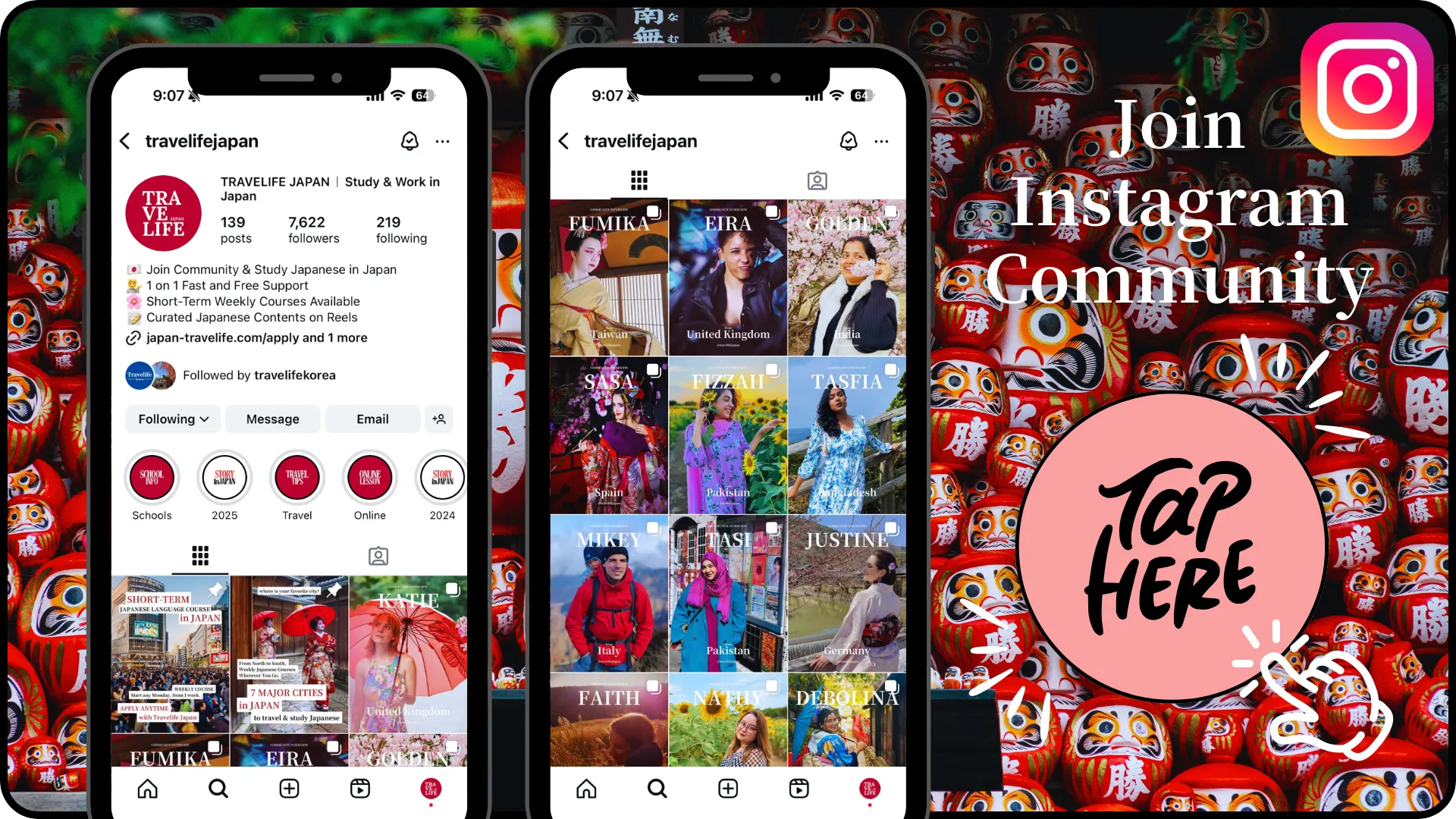Curious about Japanese slang? This quick guide dives into 30 of the most current slang phrases, reflecting Japan’s vibrant pop culture, social media, and youthful expressions. Perfect for language learners seeking to grasp the dynamic, contemporary Japanese scene and its social subtleties, these phrases are a gateway to understanding the ever-evolving Japanese language and culture.
Want to learn Japanese in Japan? Ask any questions!
Apply with Travelife Japan to receive personalized guidance, application support, and a smoother enrollment experience.
Trendy Japanese Slang Phrases in Daily Life

- ヤバい (Yabai)
Originally meaning “dangerous,” now used to express something that’s extremely good or bad, like “awesome” or “terrible.” - うける (Ukeru)
To burst out laughing; used when something is funny or amusing. - マジで (Maji de)
“Seriously?” Used to express surprise or disbelief. - げきかわ (Gekikawa)
Short for “gekiteki ni kawaii,” meaning “super cute.” - チルる (Chillru)
Derived from English “chill,” used to mean “relax” or “hang out.” - ダサい (Dasai)
“Uncool” or “out of fashion.” - ググる (Guguru)
To Google something. - ワロス (Warosu)
An internet slang for laughing, similar to “lol.” - ばり (Bari)
A Kagoshima dialect word meaning “very” or “super.” - なう (Nau)
Borrowed from English “now,” used to describe what someone is doing currently, often seen on social media. - JK (Joshi Kousei)
Short for “high school girl.” - リア充 (Riajuu)
Someone who is fulfilled in real life, opposite of someone who spends all their time online. - キモい (Kimoi)
Short for “kimochi warui,” meaning “gross” or “creepy.” - ぶっ飛ぶ (Buttobu)
To be blown away, either literally or figuratively. - モテる (Moteru)
To be popular or attractive, especially in a romantic sense. - サボる (Saboru)
To skip (class or work). - やばたにえん (Yabatani En)
An extreme level of “yabai.” - イケメン (Ikemen)
A good-looking guy. - ねーよ (Nee yo)
“No way!” or “As if!” - ウケる (Ukeru)
Something that’s funny or hilarious. - つらい (Tsurai)
“Painful” or “tough,” used to describe a difficult situation. - ガチ (Gachi)
Serious or for real. - ノリがいい (Nori ga ii)
To be easygoing or good at adapting. - テンション上がる (Tension agaru)
Getting excited or pumped up. - おつかれ (Otsukare)
Short for “otsukaresama,” meaning “thanks for the hard work.” - パリピ (Paripi)
Party people. - エモい (Emoi)
Emotional, used to describe something that moves you. - なんかいい (Nanka ii)
“Kind of good” or “somewhat nice.” - スゲー (Sugee)
An informal way to say “amazing” or “incredible.” - ぼっち (Bocchi)
Being alone or doing something alone.
Caution in Using Japanese Slang
When learning Japanese, it’s important to exercise caution when incorporating slang into your daily conversations. Slang, while a colorful and authentic aspect of the language, can be contextually sensitive and may not always be appropriate in formal or professional settings. It’s often deeply tied to contemporary youth culture and informal scenarios, making its use potentially jarring or disrespectful in traditional or older social circles. Furthermore, as a non-native speaker, using slang incorrectly can lead to misunderstandings or inadvertently offending someone. It’s crucial to understand not just the meaning of a slang term, but also its connotations and the situations where it is suitable. Observing how native speakers use slang in real-life situations can provide valuable insights. In summary, while slang can add vibrancy to your Japanese, it should be used judiciously and with an understanding of the social nuances and cultural context in which it operates.
Conclusion
Japanese slang is a vibrant and integral part of modern Japanese language, offering a window into current trends and youth culture. These phrases are a great starting point for anyone looking to deepen their understanding of everyday Japanese as it is spoken by the younger generation. While mastering formal Japanese is important, familiarizing yourself with slang can significantly enhance your conversational skills and cultural comprehension, making your study or learning of Japanese more engaging and relevant.
CONTACT US
For studying Japanese in Japan, please contact us.


